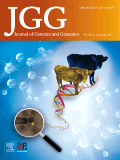
Annual Review of Genetics
Scope & Guideline
Connecting Past Discoveries with Future Innovations in Genetics.
Introduction
Aims and Scopes
- Genetic Mechanisms and Processes:
The journal emphasizes the exploration of fundamental genetic mechanisms, such as gene expression, regulation, and inheritance, in both unicellular and multicellular organisms. - Evolutionary Genetics:
A significant focus on the evolutionary aspects of genetics, including the genetic basis of adaptation, speciation, and evolutionary dynamics across various species. - Applications of Genetic Technologies:
The journal highlights the application of advanced genetic technologies, such as CRISPR and single-cell genomics, to manipulate genetic material and understand complex traits. - Interdisciplinary Approaches:
There is a consistent emphasis on integrating genetics with other biological disciplines like developmental biology, ecology, and molecular biology to provide a holistic understanding of genetic phenomena. - Human Genetics and Disease:
The journal also covers human genetics extensively, focusing on the genetic underpinnings of diseases, the role of genetic variation in health, and the implications for therapeutic interventions.
Trending and Emerging
- CRISPR and Genome Editing:
Recent papers highlight the growing interest in CRISPR technology and its applications for gene editing across various organisms, which is revolutionizing genetic research and biotechnology. - Single-Cell Genomics:
There is an increasing focus on single-cell genomics, allowing researchers to investigate cellular heterogeneity and complex traits at an unprecedented resolution. - Environmental Genomics:
Emerging themes around the genetic impact of environmental changes and global challenges, such as climate change and disease resistance, are gaining traction in the literature. - Noncoding RNAs and Regulatory Elements:
Research on noncoding RNAs and their roles in gene regulation and complex trait variation is becoming more prominent, reflecting a deeper understanding of genomic architecture. - Transcriptional and Post-Transcriptional Regulation:
An emphasis on the mechanisms of transcriptional control and the role of post-transcriptional modifications in gene expression is increasingly evident, highlighting the complexity of gene regulation.
Declining or Waning
- Basic Model Organism Studies:
Research centered solely on traditional model organisms like *Drosophila* and *C. elegans* has seen a decline, as the field shifts towards more complex systems and comparative genomics. - Purely Theoretical Genetics:
Themes focused exclusively on theoretical frameworks without empirical evidence are becoming less prominent, as the journal increasingly favors studies with practical applications and experimental validation. - Static Genetic Mapping Studies:
There is a noticeable decrease in publications that solely focus on static genetic mapping, as the field moves towards dynamic approaches that consider gene-environment interactions.
Similar Journals

HUMAN HEREDITY
Connecting Generations Through Genetic InsightsHUMAN HEREDITY is a peer-reviewed journal published by KARGER, dedicated to advancing the understanding of genetics and inherited traits in human populations. Established in 1950, this journal has become a vital resource for researchers, professionals, and students in the fields of genetics and clinical genetics, currently categorized in the third quartile (Q3) for both general and clinical genetics as of 2023. With an ISSN of 0001-5652, HUMAN HEREDITY provides rigorous academic content that analyzes heredity patterns and genetic variations, aiming to illuminate the complexities of human genetic inheritance. Although it does not operate on an open access model, the journal offers a comprehensive collection of studies and insights that are crucial for genetic research and clinical applications. Situated in Basel, Switzerland, HUMAN HEREDITY contributes to the global dialogue in genetics, making it an essential platform for those seeking to enrich their understanding of human heredity in a rapidly evolving scientific landscape.

HUMAN MOLECULAR GENETICS
Driving innovation in the genetics of human health.HUMAN MOLECULAR GENETICS, published by Oxford University Press, is a premier journal in the field of genetics, with an established reputation since its inception in 1992. With an impressive Q1 ranking in various categories, including Genetics, Clinical Genetics, and Molecular Biology, this journal engages a diverse readership by reporting significant advances in our understanding of the genetic basis of human health and disease. The journal has achieved notable rankings within Scopus, particularly in Clinical Genetics, making it a key resource for professionals and researchers aiming to stay at the forefront of genetic research. Although it operates under a traditional access model, it remains committed to disseminating high-quality research that informs clinical practice and enhances knowledge in the genetic field. The journal's impact factor signifies its crucial role in shaping contemporary genetic research and its application in medicine. As the field continues to evolve, HUMAN MOLECULAR GENETICS serves not only as an academic repository but also as a vital platform for innovation and discussion among students, researchers, and clinicians.

ANIMAL GENETICS
Transforming Knowledge into Genetic SolutionsANIMAL GENETICS, published by WILEY, is a leading journal in the fields of Animal Science and Zoology, with a commendable Q1 classification for 2023, reflecting its critical role in advancing research and knowledge in animal genetics. Established in 1986, this journal has become a cornerstone for professionals, researchers, and students alike, providing a platform for innovative research that explores the genetic underpinnings of animal biology. With an ISSN of 0268-9146 and an E-ISSN of 1365-2052, it boasts a significant impact in both agricultural and biological sciences, as indicated by its ranking of #74 out of 490 in its category on Scopus, positioning it in the 85th percentile for Animal Science and Zoology. Readers can access high-quality, peer-reviewed articles that not only illuminate current advancements but also foster future research directions. While currently not an open access journal, ANIMAL GENETICS remains vital for anyone engaged in the exploration of genetics and its applications in medicine and beyond, with a continual commitment to publishing findings that shape the future of animal breeding, conservation, and genetics research.

DEVELOPMENT GENES AND EVOLUTION
Pioneering Research at the Intersection of Genes and Development.DEVELOPMENT GENES AND EVOLUTION is a prominent academic journal published by Springer, dedicated to advancing the fields of developmental biology and genetics. With an ISSN of 0949-944X and an E-ISSN of 1432-041X, this journal plays a crucial role in disseminating high-quality research that explores the genetic underpinnings of developmental processes across various organisms. Located in the United States, the journal has maintained a strong international presence with a significant impact factor, reflecting its importance in the scientific community. It currently holds a Q3 ranking in both developmental biology and genetics, according to the latest 2023 category quartiles, indicating a solid standing among peers. With a convergence of insights from 1996 to 2024, the journal publishes original articles, reviews, and research notes that attract a diverse readership of researchers, professionals, and students. Access options include traditional subscription models and open access, ensuring that vital research is available to a broad audience. By fostering discussions on the evolution of developmental mechanisms, DEVELOPMENT GENES AND EVOLUTION continues to be an essential resource for those interested in understanding the intricate interplay between genetics and development.

JOURNAL OF EVOLUTIONARY BIOLOGY
Illuminating the Pathways of Evolutionary ChangeJOURNAL OF EVOLUTIONARY BIOLOGY, published by Wiley, is a prestigious, peer-reviewed journal that has served as a key platform for groundbreaking research in the field of evolutionary biology since its inception in 1988. With its remarkable Q1 status in the 2023 category of Ecology, Evolution, Behavior, and Systematics, the journal is recognized for its high-quality contributions and impactful findings, currently ranking 203 out of 721 in its category on Scopus, placing it in the 71st percentile. The journal covers a wide scope of topics, fostering discussions that advance our understanding of evolutionary processes and their applications, which is critical for researchers, academics, and students alike. While it does not offer Open Access options, subscribers can benefit from articles that explore diverse aspects of evolution and biodiversity. As the journal continues to evolve, it remains an essential resource for those keen on exploring the mechanisms of life’s diversity and adaptation.

Journal of Genetics and Genomics
Advancing Knowledge in Genetics and GenomicsThe Journal of Genetics and Genomics, published by SCIENCE PRESS in China, stands as a significant contributor to the fields of Genetics and Molecular Biology. With an ISSN of 1673-8527 and E-ISSN 1873-5533, this esteemed journal has achieved a remarkable reputation, holding a prestigious Q1 ranking in both Genetics and Molecular Biology as of 2023. This journal not only showcases pioneering research but also fosters vital discussions on contemporary challenges and innovations within genomic sciences. As part of its commitment to facilitating scientific advancement, the journal encompasses a range of research articles, reviews, and short communications, all aiming to illuminate the complexities of genetic structures and functions from 2007 to 2024. Researchers, professionals, and students alike are encouraged to engage with its content, which ranks favorably in Scopus—placing it within the top tier of its categories. Join the community of academic excellence and explore the latest findings that shape our understanding of genomics.

Frontiers in Genetics
Connecting Researchers to the Future of GeneticsFrontiers in Genetics is a premier academic journal dedicated to advancing the field of genetics through high-quality, peer-reviewed research. Published by FRONTIERS MEDIA SA in Switzerland since 2010, this Open Access journal provides a platform for researchers and practitioners to disseminate innovative findings across various subfields, including clinical genetics and molecular medicine. With a notable emphasis on interdisciplinary approaches, the journal holds a strong position in the academic landscape, achieving Q2 rankings in key categories such as Genetics and Molecular Medicine in 2023. Not only does Frontiers in Genetics contribute to the scholarly dialogue by publishing impactful studies, but it also promotes accessibility to vital research, ensuring that knowledge is available to a global audience. This journal is a vital resource for researchers, professionals, and students looking to stay at the forefront of genetic discoveries and their applications, reflective of its engagement with contemporary challenges in genetics and healthcare.

TRENDS IN GENETICS
Unraveling the Complexities of Genetic ScienceTRENDS IN GENETICS, published by CELL PRESS, is a leading journal in the field of genetics, recognized for its significant impact on research and advancements in the discipline. With an impressive Scopus ranking of #10 out of 347 in the category of Genetics and a 97th percentile ranking, this journal stands as a premier platform for publishing innovative, high-quality articles that shape the future of genetic research. Since its inception in 1985, TRENDS IN GENETICS has been at the forefront of the genetic sciences, continuously disseminating crucial findings while maintaining a strong commitment to scientific rigor and integrity. Although it does not currently offer open access options, its rigorous peer-review process ensures that only the most relevant and groundbreaking studies make it to publication. Scholars and practitioners in genetics will find this journal to be an invaluable resource for keeping abreast of the latest developments, trends, and methodologies that drive the field forward.

INTERNATIONAL JOURNAL OF HUMAN GENETICS
Fostering Dialogue in the World of GeneticsINTERNATIONAL JOURNAL OF HUMAN GENETICS is a distinguished publication dedicated to advancing knowledge in the fields of genetics and molecular biology. Published by KAMLA-RAJ ENTERPRISES, this journal explores critical developments and research findings from 2008 to 2016, though its coverage in Scopus has since been discontinued. With an ISSN of 0972-3757 and an E-ISSN of 2456-6330, the journal aimed to foster scholarly dialogue and serve as a resource for researchers, professionals, and students engaged in human genetics. While the journal holds a modest ranking in categories such as Biochemistry and Genetics, it remains a vital source for exploring niche topics within the realm of human genetics. Researchers interested in genetic screening, gene therapy, and clinical genetics will find valuable insights herein. Despite its pause in indexing, the journal continues to contribute to the academic discourse by disseminating critical research that bridges gaps in understanding human genetics.

BIOCHEMICAL GENETICS
Innovating the Understanding of Genetic MechanismsBIOCHEMICAL GENETICS, published by Springer/Plenum Publishers, is a prominent journal in the fields of biochemistry, genetics, and molecular biology, with a substantial impact on the scientific community since its inception in 1967. The journal holds a significant position within various academic quartiles, ranking Q2 in Ecology, Evolution, Behavior and Systematics, and Q3 in Biochemistry, Genetics, and Medicine (miscellaneous), among others, demonstrating its diverse and interdisciplinary reach. With an ISSN of 0006-2928 and an E-ISSN of 1573-4927, it is recognized for contributing critical research insights and methodologies that drive the fields of biochemical genetics forward. Although it is not an Open Access journal, it provides vital access options and resources for researchers globally, facilitating the dissemination of knowledge across institutions. Positioned within the competitive landscape of Scopus rankings, it maintains respectable standings across its focused areas, making it an invaluable resource for researchers, professionals, and students seeking to deepen their understanding of genetic mechanisms and biochemical processes.